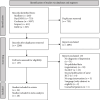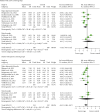Yoga for Depressive Disorder: A Systematic Review and Meta-Analysis
- PMID: 40226719
- PMCID: PMC11919030
- DOI: 10.1155/da/6071055
Yoga for Depressive Disorder: A Systematic Review and Meta-Analysis
Abstract
Background: The prevalence of depression has been increasing sharply. Given the existing treatment gap and the high prevalence of nonresponders to conventional therapies, the potential of complementary medicine becomes clear. The effect of yoga on depression has already been studied, but its efficacy in manifest depressive disorders remains unclear. Objective: To update and evaluate the current state of evidence for yoga as a therapy option for depressive disorders. Methods: PubMed/Medline, Cochrane Library, Scopus, PsycINFO, and BASE were searched systematically. Randomized controlled trials (RCTs), including participants with depressive disorders, were eligible. Analyses were conducted for active and passive control groups separately and for subgroups of major depressive disorder (MDD) and mixed samples. The risk of bias was assessed using the Cochrane risk of bias tool 2.0. Primary outcomes were the severity of depression and remission rates, and secondary outcomes were health-related quality of life and adverse events. The quality of evidence was assessed according to Grading of Recommendations, Assessment, Development, and Evaluations (GRADE). Results: Twenty-four studies (n = 1395) were included; of those, 20 studies (n = 1333) were meta-analyzed. Yoga showed a statistically significant short-term effect on depression severity when compared to passive control (standardized mean difference [SMD] = -0.43, 95% confidence interval [CI] = [-0.80; -0.07]) but not when compared to active control (SMD = -0.22, 95% CI = [-0.67; 0.23]). Regarding remission rates, statistically significant effects were observed when comparing yoga to passive (odds ratio [OR] = 3.20; 95% CI = [1.45; 7.10]) as well as to active control (OR = 2.04; 95% CI = [1.13; 3.69]). No differences on safety outcomes were observed for passive (OR = 1.00, 95% CI = [0.10; 9.98]) as well as for active control (OR = 0.80, 95% CI = [0.08; 8.09]). The quality of evidence ranged from moderate to very low. Due to the heterogeneity of outcome reporting, no meta-analysis for quality of life was possible. Conclusion: Yoga is an effective therapy approach for reducing depression severity when compared to passive control and obtains higher remission rates when compared to active and passive controls. Quality of evidence is inconsistent, but given the positive risk-benefit ratio of the intervention and the urge for therapy options for depression, yoga should be considered as a possible treatment option, particularly for MDD patients.
Copyright © 2024 Alina Moosburner et al.
Conflict of interest statement
The authors declare no conflicts of interest.
Figures




Similar articles
-
Systemic pharmacological treatments for chronic plaque psoriasis: a network meta-analysis.Cochrane Database Syst Rev. 2017 Dec 22;12(12):CD011535. doi: 10.1002/14651858.CD011535.pub2. Cochrane Database Syst Rev. 2017. Update in: Cochrane Database Syst Rev. 2020 Jan 9;1:CD011535. doi: 10.1002/14651858.CD011535.pub3. PMID: 29271481 Free PMC article. Updated.
-
Omega-3 fatty acids for depression in adults.Cochrane Database Syst Rev. 2015 Nov 5;2015(11):CD004692. doi: 10.1002/14651858.CD004692.pub4. Cochrane Database Syst Rev. 2015. Update in: Cochrane Database Syst Rev. 2021 Nov 24;11:CD004692. doi: 10.1002/14651858.CD004692.pub5. PMID: 26537796 Free PMC article. Updated.
-
Omega-3 fatty acids for depression in adults.Cochrane Database Syst Rev. 2021 Nov 24;11(11):CD004692. doi: 10.1002/14651858.CD004692.pub5. Cochrane Database Syst Rev. 2021. PMID: 34817851 Free PMC article.
-
Systemic pharmacological treatments for chronic plaque psoriasis: a network meta-analysis.Cochrane Database Syst Rev. 2021 Apr 19;4(4):CD011535. doi: 10.1002/14651858.CD011535.pub4. Cochrane Database Syst Rev. 2021. Update in: Cochrane Database Syst Rev. 2022 May 23;5:CD011535. doi: 10.1002/14651858.CD011535.pub5. PMID: 33871055 Free PMC article. Updated.
-
Physical activity for treatment of irritable bowel syndrome.Cochrane Database Syst Rev. 2022 Jun 29;6(6):CD011497. doi: 10.1002/14651858.CD011497.pub2. Cochrane Database Syst Rev. 2022. PMID: 35766861 Free PMC article.
Cited by
-
Single-Bout Strength: Acute Mental Health Responses to Resistance Training in Active Adults.Sports (Basel). 2025 Jul 7;13(7):221. doi: 10.3390/sports13070221. Sports (Basel). 2025. PMID: 40711106 Free PMC article.
References
-
- GBD 2019 Mental Disorders Collaborators. Global, Regional, and National Burden of 12 Mental Disorders in 204 Countries and Territories, 1990-2019: A Systematic Analysis for the Global Burden of Disease Study 2019. the Lancet. Psychiatry . 2022;9(2):137–150. doi: 10.1016/S2215-0366(21)00395-3. - DOI - PMC - PubMed
-
- World Health Organization (WHO) Mental Disorders. 2022. https://www.who.int/news-room/fact-sheets/detail/mental-disorders [cited 2023 Jun 7]. Available from: URL:
-
- Diagnostic and Statistical Manual of Mental Disorders. Text Revision DSM-5-TR . 5th. Washington: American Psychiatric Association Publishing; 2022.
Publication types
MeSH terms
LinkOut - more resources
Full Text Sources
Miscellaneous

